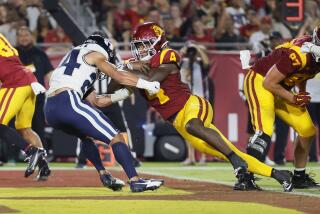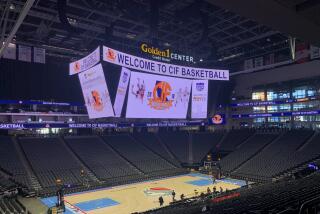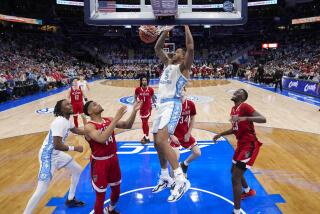Central Florida joins long line of teams that failed to break college footballâs glass ceiling
Reporting from Orlando â On Jan. 1, the anointed four best teams in college football â all with one loss â will play in semifinal games for the national title.
Just missing out was another one-loss team, followed by a group of six teams â five with two losses and one with three losses.
That takes the list down to 12th in the College Football Playoff ranking, to the only undefeated team in the Football Bowl Subdivision: Central Florida, which will take a 12-0 record into the Peach Bowl against Auburn.
By all accounts, Central Florida is big-time in everything but perception. At 66,000 students it is, by some measuring sticks, the largest university in the country. Its student population is bigger than 27 counties in Florida.
But the schoolâs athletic program is not large enough to be included in the so-called Power Five conferences: Pac-12, Southeastern, Atlantic Coast, Big Ten and Big 12. The Knights are members of the American Athletic Conference, which along with Conference USA, Mountain West, Mid-American and Sun Belt, make up the much-less-respected âGroup of Five.â
The less prestigious conferences have found a glass ceiling that allows their teams little hope of playing for the football national title, or even of cracking the top 10 in the national ranking.
âItâs not a glass ceiling, itâs cement,â said Lee Corso, a former football coach who has been an analyst and commentator for ESPN for 30 years. âThey are not going to break into it in their lifetime. Itâs the money. The people who have it donât want to share it with the people who donât.â
UCF officials, and those of other group of five schools, certainly believe that money is the key factor.
âIf youâre having to compete with someone that has a budget well north of $100 million and your budget is $40 million, $50 million, itâs tough. Itâs really tough,â said John Hitt, UCFâs president for 25 years.
âItâs just the way the world works,â he added. âReputations come slowly but they can go very quickly. But it takes a long time to build the kind of reputation you need. It always lags reality.â
The reality for the Knights is they were given the lone major-bowl spot promised to a non-Power Five team, facing three-loss Auburn on Jan. 1.
Central Florida will have Scott Frost, the national coach of the year, on the sideline in his farewell game. After only two seasons with the Knights, Frost is leaving for his alma mater, Nebraska, and taking seven of UCFâs assistant coaches with him.
Frost wanted to coach this final game even though he is essentially only in Orlando for practices, spending the rest of his time recruiting for Nebraska. A few UCF commits have now reneged and committed to the Cornhuskers, leaving some bad feelings among some UCF alumni.
Hitt sees it as UCFâs lot in life.
âYou canât afford the guy whoâs in his early 40s and burning it up,â Hitt said. â⌠You get two or three good years out of somebody like that and it can work out if youâve got an athletic director who can hire good coaches and keep them on the ranch as far as rules compliance.â
UCF hired Josh Heupel, 39, the former offensive coordinator at Missouri, about 48 hours after Frost announced that he was leaving.
The AAC was formed in 2013, and since then there have been 18 coaching changes. Six have left for Power Five conference jobs, including Tom Herman, who last year moved from Houston to Texas. The latest was Chad Morris leaving Southern Methodist for Arkansas.
Danny White, UCFâs athletic director, echoes Corso and Hitt in what makes the difference.
âWe need a more market-appropriate television deal for our conference,â White said. âIt would give us the resources. Itâs not just UCF, but there are a lot of schools in our league with huge student bodies, great cities and great recruiting bases.â
Schools in the AAC receive between $3 million and $4 million a year from television. Schools in the Pac-12 get about $29 million. The SEC provides its schools around $40 million.
The AAC does have some big markets, such as Cincinnati, Houston, Dallas and Tampa. Houston is the countryâs eighth-largest TV market, Tampa-St. Petersburg is 11th and Orlando is 18th.
The top sports radio talk-show host in Orlando is Marc Daniels, who is in his 23rd year of calling UCF games. He echoes others about the struggle of non-Power Five teams.
âThe two final football games UCF playedâ â a 49-42 win over South Florida and a 62-55 win over Memphis â âwere two of the most exciting games of the year,â Daniels said. âIf you turned down the sound and took off the logos and didnât know whoâs playing, you would absolutely think they were Power Five schools.â
Daniels, too, points to the money.
âIf you gave Mississippi State $3 million and UCF $30 million, I know who would be successful,â he said.
âI think ESPN plays a big role in painting the perception of the teams. I believe there is an agenda to not let teams in the non-Power Five conferences make it to the top 10.â
But even Daniels doesnât believe UCF should have made it to the final four.
âUCF deserved to be in the six-to-nine range,â he said. âWhat would be interesting is if they challenge the system and beat Auburn and then duplicated this year. What happens if they go 19-0, then 22-0, then 26-0. What would they do then?â
ESPNâs Corso isnât buying it.
â[UCF] is as successful as itâs going to get,â Corso said. âThey might as well enjoy it as long as they can.
âItâs life and it isnât going to change. Itâs the money. Next year itâll be Memphis and then SMU and then San Diego State. This is just UCFâs year.â
And one more chance to gain credibility.
More to Read
Go beyond the scoreboard
Get the latest on L.A.'s teams in the daily Sports Report newsletter.
You may occasionally receive promotional content from the Los Angeles Times.











